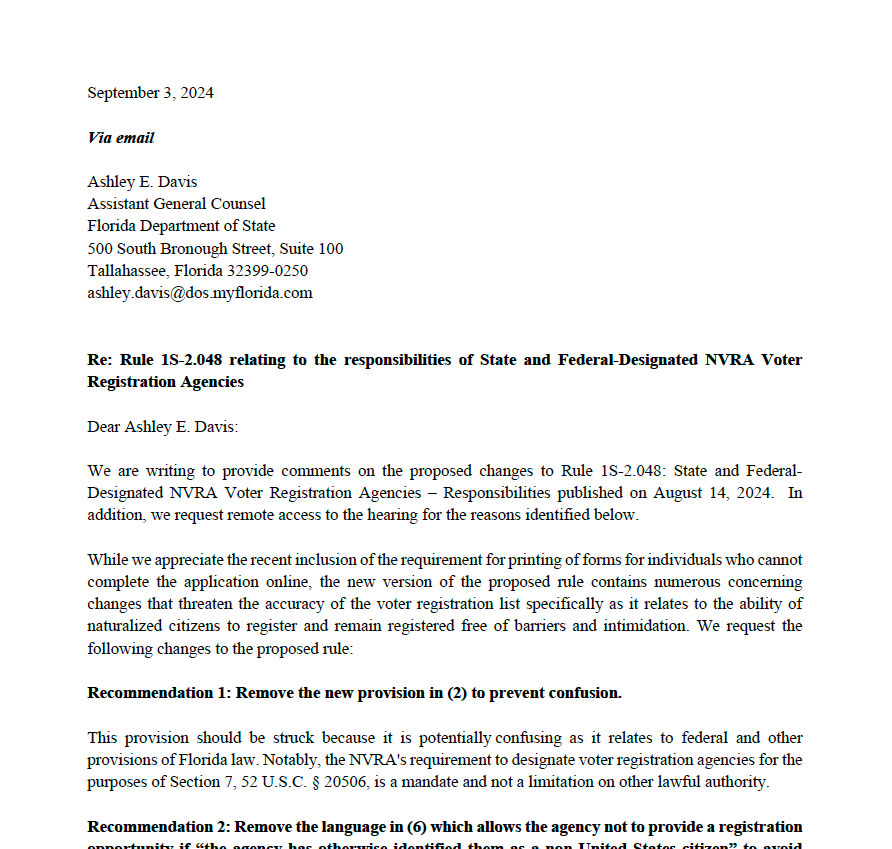Letter to Assistant General Counsel Relating to the Reponsibilities of the State and Federal-Designated NVRA Voter Registration Agencies

September 3, 2024
Via email
Ashley E. Davis
Assistant General Counsel Florida Department of State
500 South Bronough Street, Suite 100
Tallahassee, Florida 32399-0250 ashley.davis@dos.myflorida.com
Re: Rule 1S-2.048 relating to the responsibilities of State and Federal-Designated NVRA Voter Registration Agencies
Dear Ashley E. Davis:
We are writing to provide comments on the proposed changes to Rule 1S-2.048: State and Federal- Designated NVRA Voter Registration Agencies – Responsibilities published on August 14, 2024. In addition, we request remote access to the hearing for the reasons identified below.
While we appreciate the recent inclusion of the requirement for printing of forms for individuals who cannot complete the application online, the new version of the proposed rule contains numerous concerning changes that threaten the accuracy of the voter registration list specifically as it relates to the ability of naturalized citizens to register and remain registered free of barriers and intimidation. We request the following changes to the proposed rule:
Recommendation 1: Remove the new provision in (2) to prevent confusion.
This provision should be struck because it is potentially confusing as it relates to federal and other provisions of Florida law. Notably, the NVRA’s requirement to designate voter registration agencies for the purposes of Section 7, 52 U.S.C. § 20506, is a mandate and not a limitation on other lawful authority.
Recommendation 2: Remove the language in (6) which allows the agency not to provide a registration opportunity if “the agency has otherwise identified them as a non-United States citizen” to avoid targeting naturalized citizens based on outdated information.
- First, the language “otherwise identified” is not clear as to what would be the proposed basis for an agency’s designation of a person as a “non-United States citizen.” No particular information held by an agency, nor any matching criteria to ensure the agency accurately pairs information is included in the proposal. This lack of clarity is likely to lead to both erroneous and uneven application of the rule. Of utmost concern, this language is likely to ensnare recently naturalized citizens.
- Second, and relatedly, the rule contains no temporal limitation on the use of any information held by an agency, nor does it account for an individual’s use of documents that suffice for agency purposes but may not reflect recent naturalization status, such as a green card or other proof of legal
presence. Stale information has previously led to erroneous identification of naturalized citizens as ineligible in Florida as well as in other states.
- Both Florida statute and federal law require an attestation of citizenship under penalty of perjury at the point of registration. Individuals who do not self-identify as non-citizens must be afforded the opportunity to register to vote, which requires them to affirm under penalty of perjury that they are a citizen at the time of registration.
Recommendation 3: Remove Section (8)(b) similarly to avoid targeting naturalized citizens based on outdated information, and to avoid privacy concerns.
- First, this requirement is likely to lead to erroneous and removal or investigation of naturalized citizens due to outdated information in agency records. For example, the proposed rule contains no restriction on the currency or recency of the information “found” by an agency. And the only citizens for whom information of previous non-citizenship would likely exist in agency records is confined to one group isolated only by their national origin—naturalized citizens.
- Second, like the requirement in (6), 8(b) it is likely to lead to inconsistent application because the regulation does not define what constitutes “evidence of their non-United States citizenship [] found through processing the application.” It is unclear what would constitute such “evidence” or what application “processing” could lead to it.
- Finally, emailing this information as required by the rule would effectively divulge the source of an individual’s registration as well as their individual identifying numbers. This requirement raises privacy concerns including potential violation of NVRA Section 8(i)(1)’s prohibition on disclosure of the agency at which a person registered to vote.
Recommendation 4: Clarify provisions regarding the distribution of voter registration forms.
With respect to printing of forms, in Section (6)(a) we recommend clarifying that forms must be printed “free of charge.” If a voter registration agency—for example, a library—currently or in the future chooses to charge for printing services, it must be clear that such charges cannot apply to the printing of a voter registration application as this would amount to imposing a charge for the individual to be able to register to vote or update their registration.
We further recommend clarifying in Section (6)(a) that blank paper copies of DS-DE 39 must be made available. This is important to ensure that individuals who require specialized assistance from the person of their choice due to language needs or a disability or who are assisting a homebound individual, can bring the form home to obtain or provide such assistance consistent with Section 208 of the Voting Rights Act. In addition, individuals who are not computer-literate or are unable to remain at the agency to complete the form should not be required to use a computer at the agency to complete their voter registration application, regardless of whether they possess a DHSMV ID. As a further example, an individual without a DHSMV ID may need to bring the form home to ensure they can correctly enter the last four digits of their Social Security number before submitting the form.
These recommendations are attached showing “track changes” for your reference.
Request for Remote Access to Rulemaking Hearing
We further request that the Division of Elections (DOE) offer a remote access phone number or other remote access option for Wednesday’s hearing regarding Rule 1S-2.048.
DOE’s break from its decade-plus-long practice of allowing for public participation in administrative hearings via telephone undermines its “affirmative duty to inform itself to the fullest extent possible of the interest and problems of those who seek to present evidence and argument.”1 Under Section 120.54 of the Florida Administrative Procedure Act, any proposed action not exclusively concerning a procedural rule must be subject to public review.2 That requirement is essential to the Act’s purpose of “ensur[ing] due process and fair treatment of those affected by administrative actions.”3 The proposed rule will affect both agencies that provide registration services and the entire class of potential voters who will use those registration services across the entire state. Eliminating the option for those interested parties to express their views on this proposal cuts against the Administrative Procedure Act’s purpose and longstanding interpretation.
The proposed rule that will be discussed at the September 4, 2024 hearing, 1S-2.048 State and Federal- Designated NVRA Voter Registration Agencies-Responsibilities, will apply to a broad range of entities across Florida, including any office providing public assistance, any office serving persons with disabilities, and any public library.4 This list of affected entities illustrates the need for access to the hearing to expand beyond in-person attendance in Tallahassee, especially when one considers the breadth of constituencies such agencies who will be affected by changed voter registration processes. To focus on one affected set of entities, public libraries are spread across all sixty-seven of Florida’s counties, the southern-most of which are approximately eight hours away from Tallahassee by car.5 Beyond the various affected agencies that facilitate voter registration, the voters themselves will also necessarily feel the effects of this proposal and are entitled to participate in the hearing. Expecting persons from Miami-Dade County, the state’s most populous county,6 for example, to travel for eight hours to attend a hearing that will affect their ability to register to vote or update their registration deprives those individuals of a reasonable opportunity to participate in the hearing. Where the alternative is merely adhering to longstanding practice and providing a publicly accessible phone line, there is no justification for such a burden.
The statute makes clear that agencies must “give affected persons an opportunity to present evidence and argument on all issues under consideration.”7 This concern with how “affected persons” receive a proposed action speaks to the necessity of making such hearings meaningfully accessible to the public. Elsewhere in the Florida Administrative Procedure Act, there is a recognition that telephonic or other electronic means of communication provide an important mechanism for fostering full participation.8 Taken together with Section 120.54’s demonstration of “a legislative intent that agency rules are to be adopted only after. . . reasonable opportunity for public comment has been given,” it is clear that the act should be construed in favor of more, not less, public participation.9 Indeed, prior interpretations have warned against agency attempts to evade potential criticism through technical barriers to hearings and stated that the presiding official in a hearing “must make every effort to assure those present have fair opportunity to present evidence and argument which is material to the rules in question and appropriate under the circumstances.”10
Thank you for your consideration. Sincerely,
| Michelle Kanter Cohen Policy Director & Sr. Counsel Fair Elections Center | John Powers Program Director Advancement Project | Cassandra Brown, JD, MPH Co-Founder, Executive Director All About the Ballots |
| Amy Keith Executive Director Common Cause Florida | Peter Sleasman Executive Director Disability Rights Florida | Rebecca Pelham Executive Director Engage Florida Civic Fund |
| Cesar Z. Ruiz Associate Counsel LatinoJustice PRLDEF | Cecile M. Scoon, Esq. Co-President League of Women Voters of Florida Debbie Chandler, Esq. Co-President League of Women Voters of Florida | Adora Obi Nweze President NAACP Florida State Conference |
| Juanica Fernandes Executive Director State Voices Florida | Matletha Bennette Senior Staff Attorney Southern Poverty Law Center |
1 Balino v. Dep’t of Health & Rehab. Servs., 362 So. 2d 21, 24 (Fla. Dist. Ct. App. 1978); Dep’t of Health & Rehab. Servs. v. Fla. Med. Ctr., 578 So. 2d 351, 354 (Fla. Dist. Ct. App. 1991).
2 Fla. Stat. § 120.54(3)(c)1.
3 Pro Tech Monitoring, Inc. v. State, Dep’t of Corr., 72 So. 3d 277, 279 (Fla. Dist. Ct. App. 2011).
4 State and Federal-Designated NVRA Voter Registration Agencies-Responsibilities, Fla. Admin. Code. 1S-2.048 (proposed May 9, 2024).
5 Driving Directions from Miami to Tallahasee, Google Maps, https://www.google.com/maps (follow “Directions” hyperlink; then search starting point field for “Tallahassee, FL” and search destination field for “Miami, FL”)
6 Miami-Dade County, Florida, United States Census Bureau, https://data.census.gov/profile/Miami- Dade_County,_Florida?g=050XX00US12086#populations-and-people (last visited May 21, 2024).
7 Pro Tech Monitoring, Inc. v. State, Dep’t of Corr., 72 So. 3d 277, 279 (Fla. Dist. Ct. App. 2011).
8 See Fla. Stat. § 120.525(4) (“For purposes of establishing a quorum at meetings of regional planning councils that cover three or more counties, a voting member who appears via telephone . . . may be counted toward the quorum requirement . . .”)
9 Dep’t of Health & Rehab. Servs. v. Fla. Med. Ctr., 578 So. 2d at 354.
10 Balino v. Dep’t of Health & Rehab. Servs., 362 So. 2d at 24.
